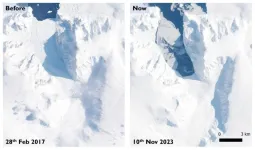(Press-News.org) Allison Pease grew up fascinated by river fish, spending countless summers in a mask beneath the surface of Texas creeks. Now a fish ecologist in the College of Agriculture, Food and Natural Resources at the University of Missouri, Pease is studying the common snook — an iconic game fish that has filled an important cultural, ecological and economic niche in Mexico for centuries. Her latest study focuses on this species’ migration patterns and the effects of proposed hydrodams on their population in southern Mexico.
For the study, Pease traveled to the states of Tabasco and Chiapas, where she investigated the snook’s almost 400-mile migration up into the rainforest habitat of the Usumacinta River. She and colleagues have found that the snook, which connect aquatic food webs and support fisheries, spawn and start their lives in coastal nursey habitats before moving into river habitats that offer an array of food resources.
Using otolith microchemistry — the measuring of the chemical composition of the layers of bone that grow in a fish’s ear as it matures — Pease determined approximately where each snook had lived during its lifetime. This gave her insight into not only the snook’s migration patterns, but also whether the fish returned to the coast of the Gulf of Mexico to spawn or spent their adult lives in the river ecosystem.
“This is a fish that is important both culturally and economically, but it’s in danger of facing a collapse due to overharvesting,” Pease said. For instance, since the 1980s there have been recurring proposals to construct hydropower dams in this river system, which would restrict the migratory domain these fish currently occupy when they go up to 400 miles into the rainforest from the Gulf of Mexico. “The more we can understand what the fish needs and where it’s moving, the more we can inform conservation efforts in terms of identifying places to restrict harvest during certain times of the year to keep this fishery going.”
From Indigenous fisheries to commercial operations, snook have been celebrated as a high-quality river fish since the time of Mayan rule, making river fisheries in Mexico important for food, Pease said. She explained that diminishing environmental resources are spurring scientists to address the conservation of these historic fish to ensure their species’ protection.
“I suspect that because people really love this fish, they might be open to accepting some more conservative regulation,” Pease said. “The fisheries are mostly self-regulated with some places that have closures and limits on what kind of net you can use. We may need to strengthen some of those restrictions, if possible, to maintain the harvest of this fish.”
In the future, Pease hopes this research will not only advance the science of understanding how the common snook function — their migration patterns, habitat preferences and spawning sites — but also serve a critical role in informing fisheries conservation. With continuing environmental change, species that depend on many different connected habitats are often the most at risk of becoming endangered.
"Otolith microchemistry highlights the importance of extensive connectivity for conservation of an iconic migratory fish in a large tropical river basin" was recently published in Aquatic Conservation.
END
MU fish ecologist’s research indicates need to conserve iconic migratory snook in Mexico
A new study on the common snook, a prized game fish, will inform conservation policy in the Usumacinta River in southern Mexico
2023-11-28
ELSE PRESS RELEASES FROM THIS DATE:
Two biomedical sciences researchers named among world’s most highly cited scientists for 2023
2023-11-28
ATLANTA — Two leading researchers in the Institute for Biomedical Sciences at Georgia State University have been ranked in the top 1 percent worldwide by citations for their field and publication year in the Web of Science database, according to the Highly Cited Researchers 2023 list by Clarivate.
The annual Highly Cited Researchers list has identified global research scientists and social scientists who have demonstrated significant and broad influence in their fields of research since 2001.
The ...
NYU Abu Dhabi researchers develop first-of-its-kind woven material made entirely from flexible organic crystals
2023-11-28
Fast facts:
Weaving is one of the oldest crafts known to humankind, with the earliest textiles dating back to about 5,000 years ago.
Organic crystals, long thought to be stiff and brittle, are now known to have extraordinary elastic properties, revealing an unexplored new direction in materials science.
Abu Dhabi, UAE, November 28, 2023: Applying simple, ancient weaving techniques to newly recognized properties of organic crystals, researchers with the Smart Materials Lab (SML) and the Center for Smart Engineering Materials (CSEM) at NYU Abu Dhabi (NYUAD) have, for the first time, developed a unique form of woven “textile.” These new fabric ...
St. Jude revealed functional targets of oncogenic HOXA9 in high-risk pediatric leukemia
2023-11-28
(MEMPHIS, Tenn. – November 28, 2023) Scientists at St. Jude Children’s Research Hospital comprehensively identified genes directly regulated by a protein associated with high-risk pediatric leukemias. High-risk leukemias, particularly MLL-rearranged (MLL-r) leukemia, often overexpress the homeodomain transcription factor HOXA9 protein, which cannot currently be targeted with drugs. This study provides a foundation for revealing the HOXA9 regulation network and finding novel drug targets downstream of HOXA9 that can form the basis of new treatments. The findings were published today in Nature Communications.
HOXA9 ...
Human rights are a low priority for many national climate change adaptation policies, new Concordia research finds
2023-11-28
The link between human rights and climate change adaptation policy has not been a major source of discussion in national policies, according to a new Concordia-led study. Moreover, the researchers say the topic should play a bigger role in the upcoming COP28 conference, opening this week in Dubai.
The paper was published in the journal Climate Policy. Assistant professor in Concordia’s Department of Geography, Planning and Environment Alexandra Lesnikowski co-authored the study with researchers from McGill University’s Faculty ...
Want school kids to eat more vegetables? Don’t forget about the power of potatoes on the plate
2023-11-28
A new study published in Nutrients illustrates how potatoes may play a beneficial role in encouraging school aged children to eat more vegetables. The Dietary Guidelines for Americans currently recommends children ages 3-18 consume between 2.5-3 cups of vegetables per day to meet their total vegetable goals. Yet, the average school-age child eats only about 1 cup daily. “That’s why we wanted to learn more about how school meal offerings may influence kids’ eating behavior and possibly encourage greater vegetable consumption,” explains principal ...
Repairing nerve cells after injury and in chronic disease
2023-11-28
LA JOLLA (November 28, 2023)—Each year in the United States there are more than 3 million cases of peripheral neuropathy, wherein nerves outside of the brain and spinal cord are damaged and cause pain and loss of feeling in the affected areas. Peripheral neuropathy can occur from diabetes, injury, genetically inherited disease, infection, and more. Salk scientists have now uncovered in mice a mechanism for repairing damaged nerves during peripheral neuropathy. They discovered that the protein Mitf helps turn on the repair function of specialized nervous system Schwann cells.
The findings, published in Cell Reports ...
First multi-chamber heart organoids unravel human heart development and disease
2023-11-28
Heart disease kills 18 million people each year, but the development of new therapies faces a bottleneck: no physiological model of the entire human heart exists – so far. A new multi-chamber organoid that mirrors the heart’s intricate structure enables scientists to advance screening platforms for drug development, toxicology studies, and understanding heart development. The new findings, using heart organoid models developed by Sasha Mendjan’s group at the Institute of Molecular ...
Race and ethnicity and emergency department discharge against medical advice
2023-11-28
About The Study: The findings of this study of 33.1 million visits to 989 U.S. hospitals suggest that Black and Hispanic patients are more likely to receive care in hospitals with higher overall discharge against medical advice (DAMA) rates, suggesting interventions should address medical segregation. Structural racism may contribute to emergency department DAMA disparities via unequal allocation of health care resources in hospitals that disproportionately treat racial and ethnic minoritized groups. Monitoring variation in DAMA by race and ethnicity and hospital suggests ...
Strategies to increase cervical cancer screening with mailed HPV self-sampling kits
2023-11-28
About The Study: Direct-mail human papillomavirus (HPV) self-sampling increased cervical cancer screening by more than 14% in individuals who were due or overdue for cervical cancer screening in this randomized clinical trial of 31,000 individuals. The opt-in approach minimally increased screening. To increase screening adherence, systems implementing HPV self-sampling should prioritize direct-mail outreach for individuals who are due or overdue for screening. For individuals with unknown screening history, ...
Scientists track rapid retreat of Antarctic glacier
2023-11-28
Scientists are warning that apparently stable glaciers in the Antarctic can “switch very rapidly” and lose large quantities of ice as a result of warmer oceans.
Their finding comes after a research team led by Benjamin Wallis, a glaciologist at the University of Leeds, used satellites to track the Cadman Glacier, which drains into Beascochea Bay, on the west Antarctic peninsula.
Between November 2018 and May 2021, the glacier retreated eight kilometres as the ice shelf at the end ...
LAST 30 PRESS RELEASES:
Genetic risk for mental illness is far less disorder-specific than clinicians have assumed, massive Swedish study reveals
A therapeutic target that would curb the spread of coronaviruses has been identified
Modern twist on wildfire management methods found also to have a bonus feature that protects water supplies
AI enables defect-aware prediction of metal 3D-printed part quality
Miniscule fossil discovery reveals fresh clues into the evolution of the earliest-known relative of all primates
World Water Day 2026: Applied Microbiology International to hold Gender Equality and Water webinar
The unprecedented transformation in energy: The Third Energy Revolution toward carbon neutrality
Building on the far side: AI analysis suggests sturdier foundation for future lunar bases
Far-field superresolution imaging via k-space superoscillation
10 Years, 70% shift: Wastewater upgrades quietly transform river microbiomes
Why does chronic back pain make everyday sounds feel harsher? Brain imaging study points to a treatable cause
Video messaging effectiveness depends on quality of streaming experience, research shows
Introducing the “bloom” cycle, or why plants are not stupid
The Lancet Oncology: Breast cancer remains the most common cancer among women worldwide, with annual cases expected to reach over 3.5 million by 2050
Improve education and transitional support for autistic people to prevent death by suicide, say experts
GLP-1 drugs like Ozempic could cut risk of major heart complications after heart attack, study finds
Study finds Earth may have twice as many vertebrate species as previously thought
NYU Langone orthopedic surgeons present latest clinical findings and research at AAOS 2026
New journal highlights how artificial intelligence can help solve global environmental crises
Study identifies three diverging global AI pathways shaping the future of technology and governance
Machine learning advances non targeted detection of environmental pollutants
ACP advises all adults 75 or older get a protein subunit RSV vaccine
New study finds earliest evidence of big land predators hunting plant-eaters
Newer groundwater associated with higher risk of Parkinson’s disease
New study identifies growth hormone receptor as possible target to improve lung cancer treatment
Routine helps children adjust to school, but harsh parenting may undo benefits
IEEE honors Pitt’s Fang Peng with medal in power engineering
SwRI and the NPSS Consortium release new version of NPSS® software with improved functionality
Study identifies molecular cause of taste loss after COVID
Accounting for soil saturation enhances atmospheric river flood warnings
[Press-News.org] MU fish ecologist’s research indicates need to conserve iconic migratory snook in MexicoA new study on the common snook, a prized game fish, will inform conservation policy in the Usumacinta River in southern Mexico





